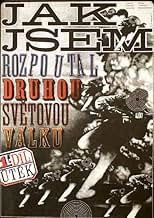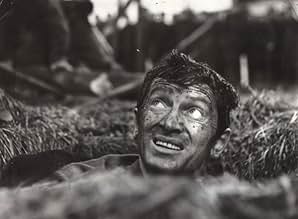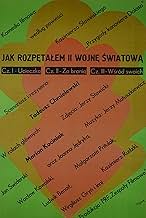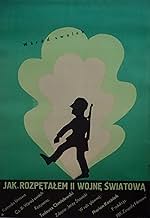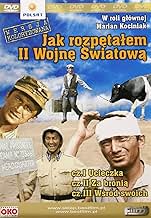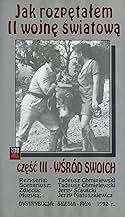Ajouter une intrigue dans votre langueThe adventures of unlucky Polish soldier Franek Dolas during world war II. In September he escapes from Stalag and goes to France. After that he fights in Africa and Europe.The adventures of unlucky Polish soldier Franek Dolas during world war II. In September he escapes from Stalag and goes to France. After that he fights in Africa and Europe.The adventures of unlucky Polish soldier Franek Dolas during world war II. In September he escapes from Stalag and goes to France. After that he fights in Africa and Europe.
Avis en vedette
Long 3 part funny story of a guy who travels all wartime Europe in almost every uniform.
Great cast of famous actors o the era. And some dialogues became classic.
Great cast of famous actors o the era. And some dialogues became classic.
Filmed in 1970, Jak rozpetalem druga wojne swiatowa (How I Unleashed World War II) emerges from a period of Polish cinema marked by a complex tension between state-imposed ideological frameworks and an increasingly sophisticated audience that had learned to read between the lines. The film, despite its overt comedic tone, was produced in a decade when Polish cinema was heavily invested in exploring the traumas of war with both sincerity and irony. The late 60s and early 70s were also years of thaw and tightening, a pendulum of relative liberalization followed by reassertions of control. In this context, the film's comedic approach to World War II can be seen not merely as entertainment or escapism, but as a form of cultural negotiation-a way to preserve memory while simultaneously relieving its burden through absurdity.
Technically, the movie displays a surprisingly polished visual sensibility, particularly for a comedy that spans multiple geographies and military situations. Cinematography is crisp, occasionally even elegant, with a remarkable attentiveness to the iconography of the war film. The color palette shifts subtly across different segments, evoking the changing atmosphere-from the gray melancholy of POW camps to the ochres and dusty tones of the North African desert. This is not mere scenic variety but a deliberate stylistic choice that mirrors the protagonist's journey through a fractured continent at war. While the film doesn't aim for the stark verisimilitude of Cross of Iron (1977), it shares with it a sensibility that avoids romanticizing the combat experience. Where Peckinpah drenches the screen in nihilism and mud, this film weaponizes the absurd.
Editing is tight, with the comic rhythm supported by sharp cuts that never allow the tempo to drag despite the narrative's episodic structure. There's an almost Chaplinesque use of silence and pacing at times, especially in sequences where the protagonist stumbles into situations of escalating farce. These are not throwaway gags but carefully choreographed bits of cinematic mischief, designed with a deep understanding of spatial comedy. The camera is often static, allowing the absurdity to unfold within the frame, rather than chasing it with frantic movements-a choice that feels closer to the style of Jacques Tati than to most war comedies.
The sound design, while modest by today's standards, is used intelligently. Musical motifs are deployed sparingly but with maximum comedic and ironic effect, reinforcing the protagonist's status as an unwitting agent of chaos. The score avoids bombast, leaning instead on understated cues that blend seamlessly with the film's tonal ambiguity. The war is never entirely off-screen, but it's rarely foregrounded through sound; this creates a strange and effective tension where the stakes feel both enormous and absurdly personal.
Acting across the board is nuanced, with performances that stay just this side of caricature. The lead delivers a balancing act that is crucial to the film's tone: he's neither a complete fool nor an everyman hero, but rather a vessel through which the randomness and contradictions of wartime experience are explored. He avoids the pitfall of playing the role as slapstick; instead, his reactions remain grounded, often showing a resigned confusion that reflects a deeper commentary on the disorientation of the individual in a continent-wide catastrophe. Supporting roles, often played by non-professional or regional actors, add texture without distracting from the central thrust. There's a careful avoidance of sentimentalism-no mean feat for a war comedy-replaced instead by a humane cynicism.
In comparison to La Grande Vadrouille (1966), which shares a similar episodic narrative and comic tone, this film feels more grounded in the Eastern European tradition of fatalism. While La Grande Vadrouille revels in its Franco-British camaraderie and breezy defiance, the Polish film maintains a more ironic distance from heroism, reflecting a national memory far more entangled with occupation, resistance, and ambiguous survival. Likewise, compared to Stalag 17 (1953), which uses a POW setting to explore loyalty and suspicion with gallows humor, this movie treats the POW camp as one more absurd theatre in which the protagonist's cluelessness disturbs the social order, stripping away any illusion of stability even within captivity.
The film is particularly interesting when considered as a counterpoint to the dominant narratives of WWII cinema of its time. It's not concerned with glorifying resistance or suffering, nor does it seek to reconstruct battles or pay homage to fallen comrades. Instead, it aligns more with the comic-tragic tradition of Eastern European storytelling where survival often appears as a matter of chance, and where dignity is maintained not through solemnity but through the ability to laugh at the unbearable. That it was made in a socialist state and still allowed to frame the war through the eyes of a bumbling, accidental saboteur speaks volumes about the shifting boundaries of acceptability in Polish media at the time. It reflects an era when satire had become a subtle but powerful tool for navigating censorship-a method to both affirm and undermine official narratives.
The fact that the movie maintains a certain visual and tonal coherence across its multiple parts is testament to a strong directorial vision, even if at times the narrative momentum sags slightly under the weight of its length. Unlike many serialized or multi-part war comedies, it never fully tips into chaos or incoherence. There's a restraint that keeps the episodic madness from becoming repetitive. Each segment finds a new variation on the theme of accidental disruption, offering fresh settings, characters, and ironies.
There are moments, however, when the film's comedic strategy risks undermining its own historical texture. While the absurdist tone is one of its greatest strengths, it occasionally brushes too lightly against contexts-such as occupied territories or wartime atrocities-that demand more gravity. These tonal shifts are managed more gracefully than in some contemporary attempts at war comedy, but they nonetheless raise questions about the limits of the genre. The film stops short of vulgarization, but its refusal to ever fully engage with the horrors it skirts can feel evasive.
Still, this movie remains a rare example of a war comedy that manages to maintain historical specificity without becoming didactic or sentimental. It is very much a product of its time and place-rooted in a Polish historical consciousness that is acutely aware of both victimhood and farce, of martyrdom and misadventure. Its place in the canon of WWII cinema is unique: neither heroic epic nor bitter satire, it's an ambivalent, mischievous detour through the peripheries of wartime experience. In a genre often dominated by clear moral binaries and reverent solemnity, its playful irreverence and formal inventiveness offer a welcome, if disorienting, departure.
Technically, the movie displays a surprisingly polished visual sensibility, particularly for a comedy that spans multiple geographies and military situations. Cinematography is crisp, occasionally even elegant, with a remarkable attentiveness to the iconography of the war film. The color palette shifts subtly across different segments, evoking the changing atmosphere-from the gray melancholy of POW camps to the ochres and dusty tones of the North African desert. This is not mere scenic variety but a deliberate stylistic choice that mirrors the protagonist's journey through a fractured continent at war. While the film doesn't aim for the stark verisimilitude of Cross of Iron (1977), it shares with it a sensibility that avoids romanticizing the combat experience. Where Peckinpah drenches the screen in nihilism and mud, this film weaponizes the absurd.
Editing is tight, with the comic rhythm supported by sharp cuts that never allow the tempo to drag despite the narrative's episodic structure. There's an almost Chaplinesque use of silence and pacing at times, especially in sequences where the protagonist stumbles into situations of escalating farce. These are not throwaway gags but carefully choreographed bits of cinematic mischief, designed with a deep understanding of spatial comedy. The camera is often static, allowing the absurdity to unfold within the frame, rather than chasing it with frantic movements-a choice that feels closer to the style of Jacques Tati than to most war comedies.
The sound design, while modest by today's standards, is used intelligently. Musical motifs are deployed sparingly but with maximum comedic and ironic effect, reinforcing the protagonist's status as an unwitting agent of chaos. The score avoids bombast, leaning instead on understated cues that blend seamlessly with the film's tonal ambiguity. The war is never entirely off-screen, but it's rarely foregrounded through sound; this creates a strange and effective tension where the stakes feel both enormous and absurdly personal.
Acting across the board is nuanced, with performances that stay just this side of caricature. The lead delivers a balancing act that is crucial to the film's tone: he's neither a complete fool nor an everyman hero, but rather a vessel through which the randomness and contradictions of wartime experience are explored. He avoids the pitfall of playing the role as slapstick; instead, his reactions remain grounded, often showing a resigned confusion that reflects a deeper commentary on the disorientation of the individual in a continent-wide catastrophe. Supporting roles, often played by non-professional or regional actors, add texture without distracting from the central thrust. There's a careful avoidance of sentimentalism-no mean feat for a war comedy-replaced instead by a humane cynicism.
In comparison to La Grande Vadrouille (1966), which shares a similar episodic narrative and comic tone, this film feels more grounded in the Eastern European tradition of fatalism. While La Grande Vadrouille revels in its Franco-British camaraderie and breezy defiance, the Polish film maintains a more ironic distance from heroism, reflecting a national memory far more entangled with occupation, resistance, and ambiguous survival. Likewise, compared to Stalag 17 (1953), which uses a POW setting to explore loyalty and suspicion with gallows humor, this movie treats the POW camp as one more absurd theatre in which the protagonist's cluelessness disturbs the social order, stripping away any illusion of stability even within captivity.
The film is particularly interesting when considered as a counterpoint to the dominant narratives of WWII cinema of its time. It's not concerned with glorifying resistance or suffering, nor does it seek to reconstruct battles or pay homage to fallen comrades. Instead, it aligns more with the comic-tragic tradition of Eastern European storytelling where survival often appears as a matter of chance, and where dignity is maintained not through solemnity but through the ability to laugh at the unbearable. That it was made in a socialist state and still allowed to frame the war through the eyes of a bumbling, accidental saboteur speaks volumes about the shifting boundaries of acceptability in Polish media at the time. It reflects an era when satire had become a subtle but powerful tool for navigating censorship-a method to both affirm and undermine official narratives.
The fact that the movie maintains a certain visual and tonal coherence across its multiple parts is testament to a strong directorial vision, even if at times the narrative momentum sags slightly under the weight of its length. Unlike many serialized or multi-part war comedies, it never fully tips into chaos or incoherence. There's a restraint that keeps the episodic madness from becoming repetitive. Each segment finds a new variation on the theme of accidental disruption, offering fresh settings, characters, and ironies.
There are moments, however, when the film's comedic strategy risks undermining its own historical texture. While the absurdist tone is one of its greatest strengths, it occasionally brushes too lightly against contexts-such as occupied territories or wartime atrocities-that demand more gravity. These tonal shifts are managed more gracefully than in some contemporary attempts at war comedy, but they nonetheless raise questions about the limits of the genre. The film stops short of vulgarization, but its refusal to ever fully engage with the horrors it skirts can feel evasive.
Still, this movie remains a rare example of a war comedy that manages to maintain historical specificity without becoming didactic or sentimental. It is very much a product of its time and place-rooted in a Polish historical consciousness that is acutely aware of both victimhood and farce, of martyrdom and misadventure. Its place in the canon of WWII cinema is unique: neither heroic epic nor bitter satire, it's an ambivalent, mischievous detour through the peripheries of wartime experience. In a genre often dominated by clear moral binaries and reverent solemnity, its playful irreverence and formal inventiveness offer a welcome, if disorienting, departure.
This is one of the best comedies in the world. Very subtle and pleasant humor in such a humor-heavy setting like war. In terms of mood and light style, the film can be compared to "Rosencrantz and Guildenstern are Dead" and Taika Waititi's films.
It's a story about a polish rifleman - Franek Dolas.It begins on 1st October of 1939 when Nazis invade Poland.Generally the whole movie is divided into three episodes.In the first one Franek gets himself into German pow camp.He is making his best trying to escape but everything he does gets him only into more trouble.Frankly speaking Franek is a kind of guy that is always getting into some kind of trouble.When he wants to do something right the result is opposite every time. Through all three episodes we can see Franek's funniest adventures in occupied Poland,Yugoslavia,Italy,few other European countries and even Africa where he joins French Foreign Legion. I think that it should be very interesting and funny for Europeans to see what the Poles think about them and why we sometimes laugh about English or Italians for example :P
Contrary to what that one comment on the bottom says, there are so many moments during this movie that are so hilarious that you can hardly contain yourself. Its funny, and yet gives you a thing to think about. It's a classic and you won't be disappointed. The whole language realism makes it even better. I will say though, it is an especially long movie, consisting of 3 parts, each about an hour, but it is still worth every minute. I have heard people say that there is nothing funny about ww2. Well this exists, and this came out in a rather dark time in Poland's history, and that really goes to show how you can really make something terrible into something enjoyable. The fact that this came out from a communist film studio and that it is better than most modern movies is truly something else.
Le saviez-vous
- AnecdotesThe film is unique in terms of language realism: members of each nationality, encountered by a main hero on his way, speak their own language (German, Serbo-Croatian, French, Italian, English), what makes his adventures and communication problems more realistic.
- GaffesWhen the film was colorized in 2000, the Yugoslav flag was miscolored, with green in the place of blue.
- Citations
Pvt. Franek Dolas: B-but our place is in the Polish army! We must fight for Poland!
Sgt. Kiedros: And for which Poland do you want to fight for?
- Autres versionsAlso shown in computer colorized version. This version was prepared by "Dynacs Digital" and has never been released theatrically. It was first shown by TV Polsat.
- ConnexionsReferenced in Nie lubie poniedzialku (1971)
Meilleurs choix
Connectez-vous pour évaluer et surveiller les recommandations personnalisées
- How long is How I Unleashed World War II?Propulsé par Alexa
Détails
- Date de sortie
- Pays d’origine
- Langues
- Aussi connu sous le nom de
- How I Unleashed World War II
- Lieux de tournage
- Zgierz, Lódzkie, Pologne(POW camp)
- société de production
- Consultez plus de crédits d'entreprise sur IMDbPro
- Durée
- 3h 44m(224 min)
- Couleur
- Mixage
- Rapport de forme
- 2.35 : 1
Contribuer à cette page
Suggérer une modification ou ajouter du contenu manquant

